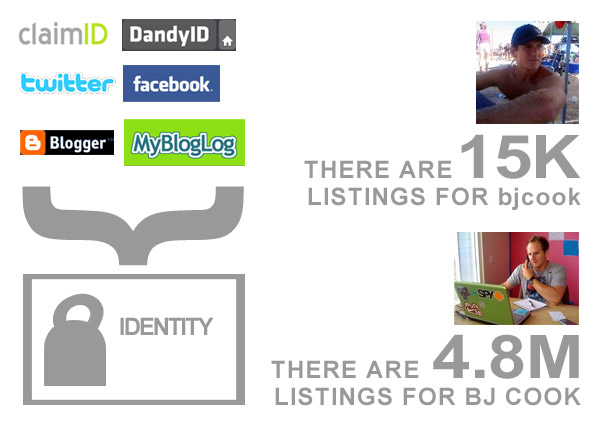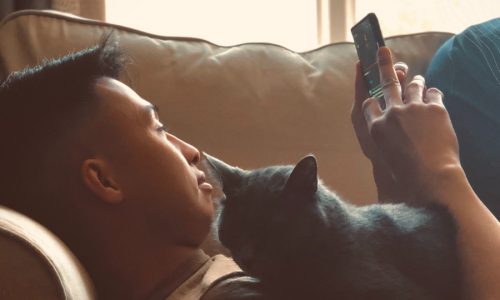BLOG/Technology
Online Identity Evolutions
 One of the most inspiring things about the digital landscape is the access and sharing of information. I had a chance to read some of Chris Messina's thoughts on the new Mozilla Online Identity concept. I've been interested in what Chris has been working on since my very own "portable profiles" idea back in 2006, which I pitched to a new startup client at the time. It was too much of a long term strategy they thought, so I went ahead and did my own due diligence with a patent search. What I discovered was that, yes it was too early, but there were many people in a small community trying to solve the problem of 50 usernames and passwords alongside masses of personal assets strewn across the web like breadcrumbs reminding you where you had once been.
One of the things Chris said that caught my attention was:
"In practice, much of what I’ve described is already possible using recent protocols and formats. It’s really just a matter of providing a unified experience through the browser and pushing for wider adoption of these technologies across the most popular social web services."
In reading Chris's thoughts and what Mozilla was up to, I thought about my own identity across the web and some of the opportunities that would be presented to us in the near future. I even shot a quick email to my team to encourage some of their own thoughts. Here's a run down:
One of the most inspiring things about the digital landscape is the access and sharing of information. I had a chance to read some of Chris Messina's thoughts on the new Mozilla Online Identity concept. I've been interested in what Chris has been working on since my very own "portable profiles" idea back in 2006, which I pitched to a new startup client at the time. It was too much of a long term strategy they thought, so I went ahead and did my own due diligence with a patent search. What I discovered was that, yes it was too early, but there were many people in a small community trying to solve the problem of 50 usernames and passwords alongside masses of personal assets strewn across the web like breadcrumbs reminding you where you had once been.
One of the things Chris said that caught my attention was:
"In practice, much of what I’ve described is already possible using recent protocols and formats. It’s really just a matter of providing a unified experience through the browser and pushing for wider adoption of these technologies across the most popular social web services."
In reading Chris's thoughts and what Mozilla was up to, I thought about my own identity across the web and some of the opportunities that would be presented to us in the near future. I even shot a quick email to my team to encourage some of their own thoughts. Here's a run down:
- "Following" extends beyond just statuses and drills down into asset types like photos, videos and profile types.
- Sharing your location enables newspapers to have value again! Viewing NYTimes based on my zipcode and profile offers me neighborhood specific content like deals, events, movies, personals and friend's plans as a viewable layer.
- Technologies like iPad provides interactive experiences for managing profile-types when you travel - My San Diego profile is different than my NJ profile because of the places I go, purchases I make, connections I have in each area; recommendations become better targeted.
- Following your favorite bands gets better - You can choose to follow only their videos and new tracks posted to iTunes. You may hate their statuses, photos, etc.
- Browsers may hold the key to how your identity is managed across the digital landscape - whether on your laptop, phone, iPad, tv; activities, interactions, sharing, communicating will be seamless.
- Education can be done from anywhere and courses are tuned for you on an individual basis and information is crowdsourced and created by the students and professors in harmony. Think free-flowing, living books. Like developers use versioning, the same could be possible in textbooks.
- Check-ins become a commodity and consolidate under a couple service providers, giving the SMB market a truly targeted way to connect with their customers.
- Finding that perfect pickup game with the right level players is a non-issue.
- Preferences in video games, car stereo receivers and kiosks would all be decentralized and portable; no matter what device, where you are, your login/id personalizes it for you.
- Forget clipping coupons, remembering vouchers or gift certificates; your profile contains that information and accessible anytime.
- Discovery becomes more about tuning the degree at which you want a new experience vs. something highly targeted to you. Think of it as a viewing the world through filtered layers that you control the intensity.
- Rewards cards and keychain tags? Throw them out. Customer loyalty programs will get integrated, your device knows your location and displays the right barcode to be scanned.
- Friends will follow you everywhere. You'll have layers of friends that you control what they have access to from your online identity. Don't want your mom seeing your Vegas weekend videos?
More from the
DO Blog

Designing & Building Product Finder Quizzes for eCommer...
Strategy & Planning / December 23, 2020
View Blog Post
3 Customer Motivation Strategies to Improve Your eCommerce i...
Strategy & Planning / July 27, 2020
View Blog Post
